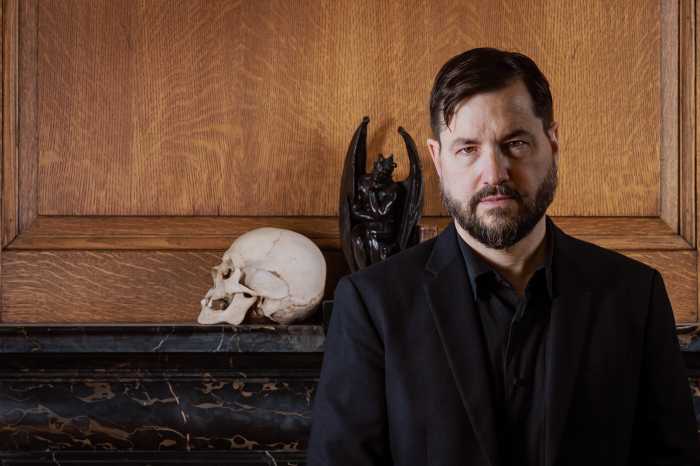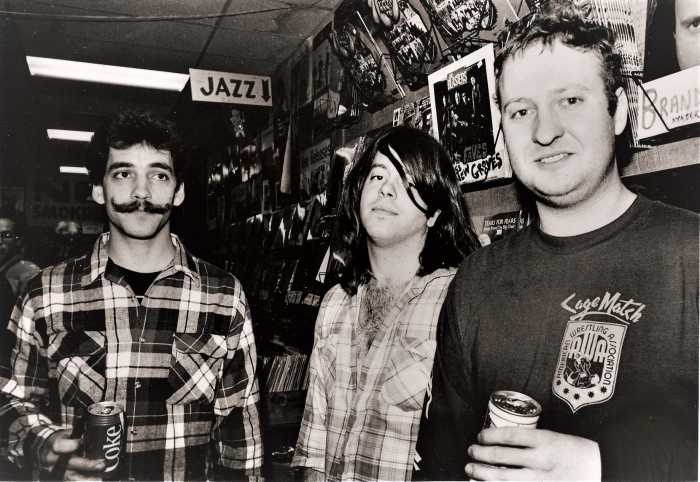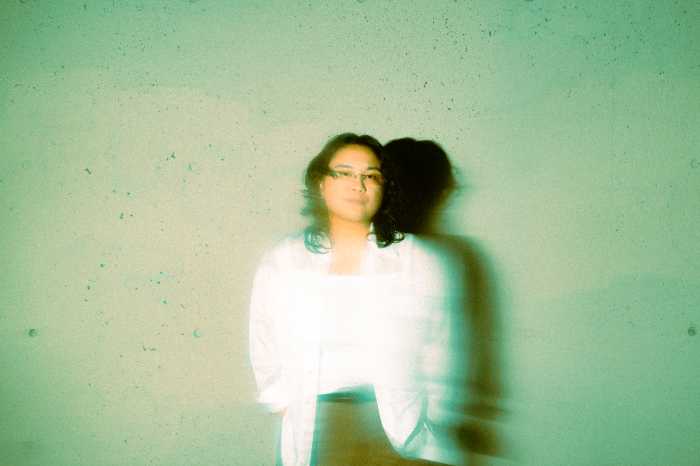Leonardo Capalbo and Sondra Radvanovsky in the Canadian Opera Company production of “Roberto Devereux.” | MICHAEL COOPER
BY DAVID SHENGOLD | Sondra Radvanovsky’s role debut as Elizabeth in Canadian Opera Company’s “Roberto Devereux” — coming to the Met stage two seasons from now — certainly excited Toronto audiences. Her bravely theatrical performance (seen April 29) generated ovations and a huge buzz online, but as a totality remains a work in progress, a very good first pass at a supremely tough role.
Pianissimi were often exquisite. Sometimes the huge, electric voice executed smooth runs, but technical challenges remain, and while Radvanovsky proved touching she never strung words imprintingly on a bel canto line in the manner of a Callas, Scotto, or Sills.
Stephen Lawless’ over-detailed, over-busy “history lesson”-style production didn’t help. Wax museum-style cases of Henry VIII and Anne Boleyn rolled out as the elderly, gray-haired queen tottered around during the Prelude, guaranteeing that she herself would disappear into one, muddying the work’s powerful final moments. Lawless interestingly stressed rulership’s performative aspects, but spaces were alternately too crowded and too distended.
Varied classical vocal delights all over
Dressed like Marlon Brando in “The Wild One,” directed to radiate louche sexuality throughout, Leonardo Capalbo was more stable boy than earl. His diction was gratifyingly clear, but in Act One his overstressed, choked tenor proved nearly unlistenable. He did better later on, but attractive sounds were the province of Allyson McHardy — a lovely Handelian mezzo not suited to Donizetti’s high attacks — and especially of Russell Braun, though vocally miscast a really admirable Nottingham musically and dramatically, never overtaxing his instrument.
Corrado Rovaris led propulsively.
Boston’s Handel and Haydn Society has a long, proud tradition: they’re the oldest continually performing arts group in the United States, founded in 1815. May 4’s concert of Handel’s oratorio “Samson” at Symphony Hall reminded one that, under music director Harry Christophers — in charge for the last five years — the chorus is absolutely top notch. Despite wonderful performances from two of the soloists — soprano Joelle Harvey as Dalila and a Philistine Woman, and bass-baritone Matthew Brook as Samson’s father Manoah — the chorus deservedly won the greatest cheers.
Harvey’s light, clean soaring timbre and spectacular technical facility always delight. With the quiet, violin-accompanied “With plaintive note,” the purity of her singing drew tears, which returned for Brook’s simple, heartfelt traversal — in strong, beautifully projected and articulated sound — of “How willing my paternal love.”
Dashon Burton, a darkly resonant Harapha , showed good passagework; his words were not as telling as those of chorus tenor Stefan Reed, an alert Messenger. Agile soprano Sonja DuToit Tengblad fared nicely as the Israelite Woman in the work’s sparkling last minutes. The instrumental playing was sterling, save for the weak, wavery baroque horns — the same section that faltered in Nic McGegan’s March “Samson” in New York.
One annoyance amidst all H & H’s virtues is that Christophers — working in one of North America’s centers for early music — has consistently hired British vocal soloists for a huge percentage of the works performed. In Brook’s case, it paid off handsomely, but the travel, visa, and housing costs must be considerable and this fact can hardly inspire those young North American singers in command of the requisite styles to pursue their craft. Catherine Wyn-Rogers, a yearly visitor, certainly knows her Handel style and managed to downplay as Micah the vocal depredations that made her (also poorly acted) Met Adelaide in “Arabella” such an unnecessary import. But tenor Joshua Ellicott’s flinty, burred tenor proved a trial as Samson. Britain has no lock on Handel style, still less on Bach style. Does Christopher really think that North America has no “Messiah” tenors? Does he never attend the Boston Early Music Festival or the concerts of Boston Baroque?
Philadelphia’s Chamber Music Society consistently has outstanding vocal recitals at prices far below those in New York — and often in more suitable venues. On May 6 at the Philosophical Society in Olde City (a restaurant mecca), masterful veteran pianist Richard Goode gave a recital largely shared with young Curtis Institute soprano Sarah Shafer. Already singing with the local Opera Company, Shafer performs with a sincerity, musicality, and attention to verbal detail that reflect credit on and evoke her distinguished teachers, Benita Valente and Joan Patenaude-Yarnell.
Goode worked and recorded with Valente decades ago, and his fine collaboration with Shafer in songs by Schumann, Debussy — the “Ariettes oubliées,” for once not tiresome but keenly interpreted and purely vocalized — and Hugo Wolf seemed an extension of their fine work together. Goode and Shafer phrase with utmost naturalness and produce sterling tonal combination. Best of all were the Schubert encores (“Rastlose Liebe” and “Im Fruehling”) — since Schubert is the best of all.
Next season PCMS offers many fine singers, all paired with excellent pianists: Mark Padmore/ Jonathan Biss; Dawn Upshaw/ Gilbert Kalish; Susanna Phillips and Eric Owens/ Myra Huang; Shafer/ Lydia Brown; Matthew Polenzani/ Julius Drake; and Dorothea Roeschmann/ Mitsuko Uchida. Few American cities do more to welcome queer travelers; day and overnight trips recommended.
On May 15, the New York Philharmonic auspiciously played Mahler’s Third Symphony under Bernard Haitink. The 85-year-old Dutch maestro has long been an expert Mahler interpreter, and for this curious, multi-modal work — all six movements and 90 allusion-crammed minutes of it — one needs an accomplished leader to make it sound an organic whole, as Haitink did.
The orchestra fared very well — the Phil strings seemed on fire, not a common occurrence — and both concertmaster Glenn Dicterow and the offstage trumpeter performed magically. The only source of opening night glitches and pitch problems was the horn section, whose instruments — one kept reminding oneself — are of remarkable difficulty.
Bernarda Fink’s mezzo has — like that of Anne Sofie von Otter — grown more sopranoish in timbre over time, and a slight register break was evident in the repeated phrase “Gib acht,” but Fink still provides a very attractive sound and remains a class act in terms of chiseled line, verbal meaning, and intonation.
The Women of New York Choral Arts and the Brooklyn Youth Chorus performed with alertness and accuracy.
David Shengold (shengold@yahoo.com) writes about opera for many venues.





































